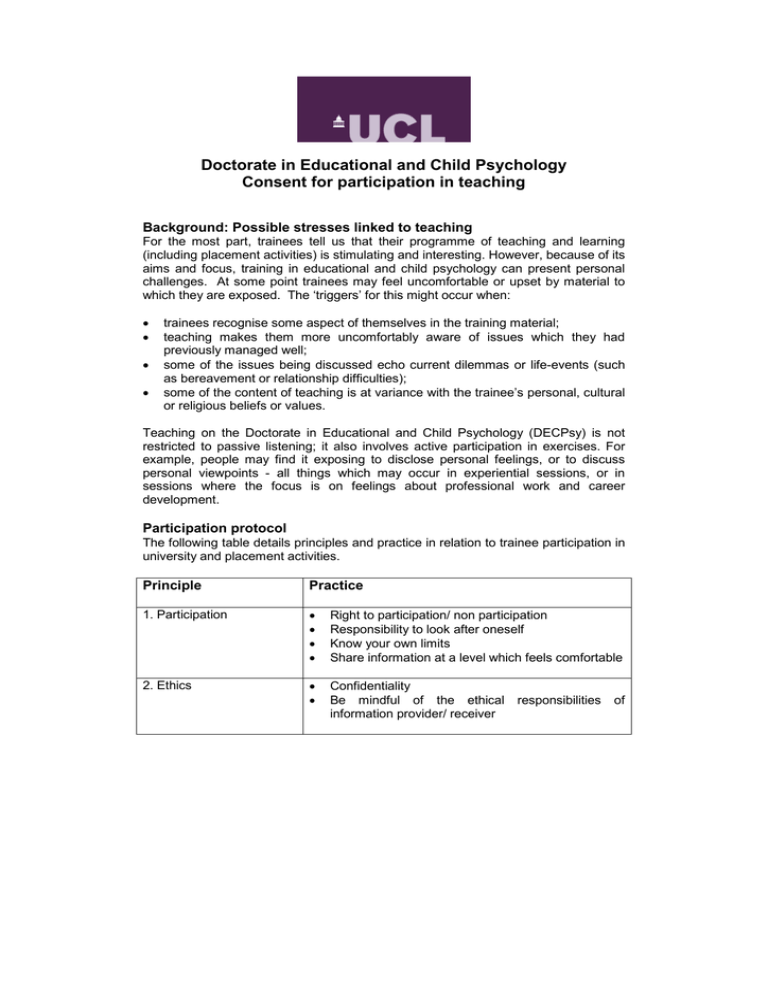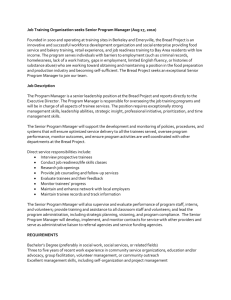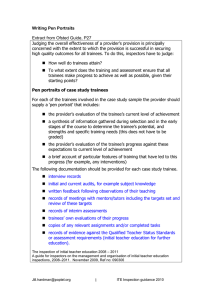Doctorate in Educational and Child Psychology Consent for participation in teaching
advertisement

Doctorate in Educational and Child Psychology Consent for participation in teaching Background: Possible stresses linked to teaching For the most part, trainees tell us that their programme of teaching and learning (including placement activities) is stimulating and interesting. However, because of its aims and focus, training in educational and child psychology can present personal challenges. At some point trainees may feel uncomfortable or upset by material to which they are exposed. The ‘triggers’ for this might occur when: trainees recognise some aspect of themselves in the training material; teaching makes them more uncomfortably aware of issues which they had previously managed well; some of the issues being discussed echo current dilemmas or life-events (such as bereavement or relationship difficulties); some of the content of teaching is at variance with the trainee’s personal, cultural or religious beliefs or values. Teaching on the Doctorate in Educational and Child Psychology (DECPsy) is not restricted to passive listening; it also involves active participation in exercises. For example, people may find it exposing to disclose personal feelings, or to discuss personal viewpoints - all things which may occur in experiential sessions, or in sessions where the focus is on feelings about professional work and career development. Participation protocol The following table details principles and practice in relation to trainee participation in university and placement activities. Principle Practice 1. Participation Right to participation/ non participation Responsibility to look after oneself Know your own limits Share information at a level which feels comfortable 2. Ethics Confidentiality Be mindful of the ethical information provider/ receiver responsibilities of 3. Tutor/ visiting speaker input 4. Debrief 5. Placement Presenters to check out activities with trainees prior to delivery Reminder of participation protocol Informed notion of what the task might entail (what trainees are ‘getting in to’) Build time for debrief into the session Availability of presenter after session (in person; telephone; email) Availability of tutors (in person; telephone; email) Time available within session Signpost other services (see Support for trainees, below) Awareness of personal issues which might impact on ability to undertake casework (e.g. identification with issues, such as Critical Incident Response Team work following a bereavement). Checking if ‘debriefing’ is available as part of supervision. If not, seeking other opportunities (e.g. via another EP, tutor, etc). Support for trainees Although there is an expectation that trainees will be appropriately robust in relation to the issues which training throws their way, we also expect trainees to be able to reflect on their feelings and to recognise when seeking support from others is the most appropriate action. The Year 1 programme handbook contains clear information about sources of support. Consent to participation in teaching and learning activities It is a requirement of the Health and Care Professions Council (HCPC) that when trainees participate in teaching they have given informed consent to this. For this consent to be meaningful it is important to set out the expectations of the DECPsy programme, and the rights of trainees. Programme expectations in relation to teaching The DECPsy programme expects that trainees will actively participate in all aspects of the academic programme, including: Seminars Experiential exercises which take place as part of workshops Group activities (such as experiential groups) Problem based learning modules Role-plays and simulated scenarios (including taking the role of psychologist and client) Practising techniques Counselling activities Where a trainee finds participation difficult they are entitled to withdraw, but the programme expects them to do this in an appropriately professional manner. If their level of personal distress results (for example) in prolonged withdrawal from specific areas of teaching, it is expected that the trainee take appropriate action. This would normally include discussion with their tutor, who can arrange for them to be exempted from teaching activities, and who will also discuss the most suitable strategies for managing the situation. In practical terms, trainees who find themselves distressed during a lecture or a workshop are entitled to leave, returning if they feel able to, and if possible discussing their absence with the seminar presenter or a university tutor. Trainees who feel that a workshop task is too personally demanding are entitled not to participate, but should do so in an appropriately negotiated manner, if possible discussing this with the seminar presenter and/or a university tutor. Disclosure of personal information During teaching there should be no pressure on trainees to disclose personal information which they feel uncomfortable revealing, especially personal information which they do not see as relevant to the task of training. However, the nature of the programme means that discussion of personal feelings in relation to professional development is often appropriate and necessary, and there is an expectation that trainees will be open to discussion of these feelings if these are relevant to their personal and professional development. Feedback and evaluation Trainee feedback is highly valued by the course team and is an extremely important source of information for both course review and individual tutor development. Each DECPsy course member is expected to complete weekly feedback evaluations, usually presented online. The content of the feedback is anonymous, but nonrespondents are identified by their UCL username so reminders can be sent. The collated feedback on each session/unit is made available to the Co-Directors and to any UCL tutor involved in teaching it. It is expected that all feedback will comply with the guidelines for giving feedback provided in the Programme Handbook. Trainees may opt not to comment on a particular session should they wish, or instead to seek a meeting with their Professional Development Tutor, or with a Co-Director. From time to time trainees may be asked to provide additional relevant information, relating for example to their teaching preferences, learning styles and strategies, confidence in knowledge development. This information is sought for the purpose of evaluating the success of different elements of the programme in addressing the needs of the full diversity of learners. All data is coded and cross-matching carried out so as to ensure that anonymity is maintained. Confidentiality Trainees who discuss any experience of stress arising from teaching or placement (or indeed any personal issue) with a member of staff are entitled an assurance of confidentiality. This means that information that they disclose will not usually be discussed with third parties without their consent and/or knowledge. As in other professional contexts, a guarantee of confidentiality cannot be absolute, as might be the case if there were serious concerns about the welfare of the trainee. Any such breaches would be rare, and would usually be discussed with the trainee. The HCPC publish guidance relating to confidentiality on their website (the document is entitled ‘Confidentiality – Guidance for registrants’), and this expands on the principles set out in this paragraph. The guidance is available at http://www.hpcuk.org/assets/documents/100023F1GuidanceonconfidentialityFINAL.pdf. Consenting to participate At the end of this document is a formal consent form. Signing it means that trainees acknowledge and accept the expectations set out above. Because these make it clear that there may be circumstances where they might wish to withdraw from teaching, it should be clear that while they are consenting to participate in teaching this consent is not absolute, and includes the right to withdraw if there are good grounds for doing so. ‘Informed consent’ means that trainees are not obliged to sign this form. If they have any queries about it they are free to discuss it and its implications with their tutor, or one of the programme directors. Doctorate in Educational and Child Psychology Consent to participation in teaching please indicate with a cross I have read the background information provided by the Programme which: a) acknowledges the potential stresses inherent in teaching on the DECPsy b) sets out expectations of trainees in relation to their participation in teaching and evaluation on the DECPsy please indicate with a cross I am aware that I am not obliged to sign this form. please indicate with a cross I am aware of the relevant sections of the Year 1 programme handbook which describe the sources of support offered by the programme and by external agencies. I consent to participate in the teaching provided by the Doctorate in Educational and Child Psychology at University College London. Name of trainee: Signature: c.c Trainee Trainee file Date:


